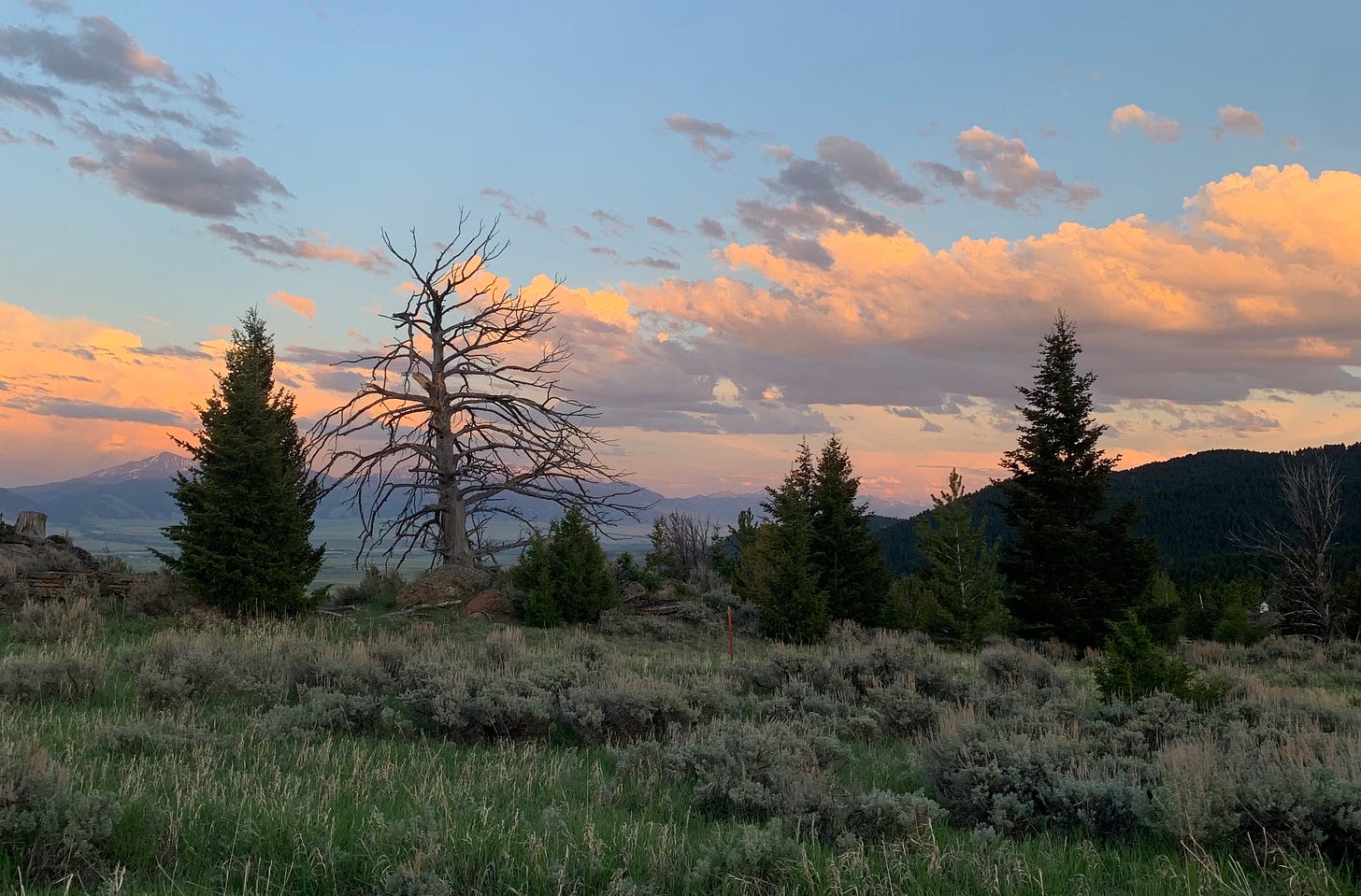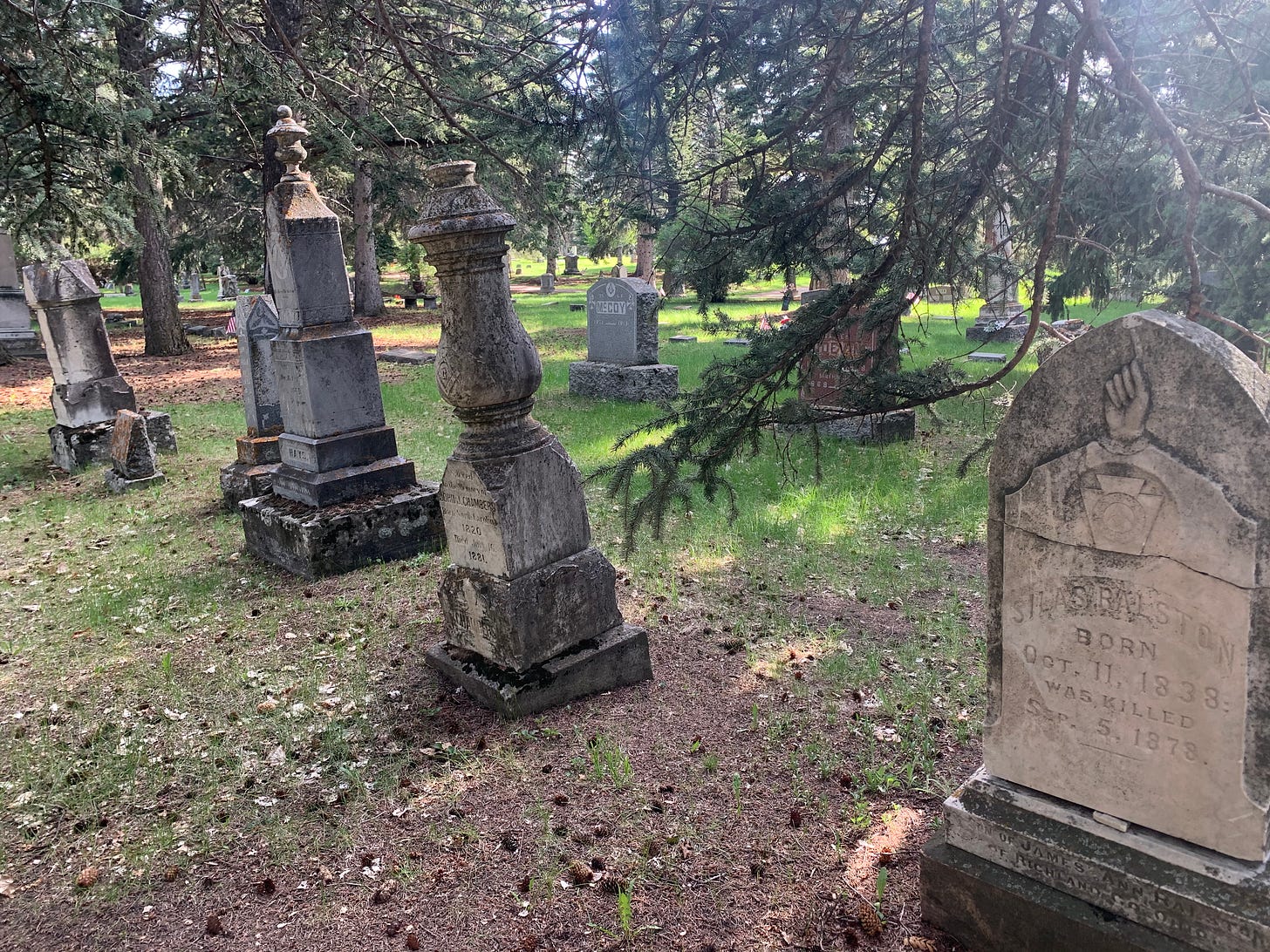Dear Kate,
On Memorial Day morning, I woke up in a $40 hostel in Bozeman, Montana.
I wandered into a bathroom shared by a dozen other travelers, backpackers, and hikers. It smelled like sweat and stale popcorn. I wondered briefly: Am I getting too old for this?
I got dressed and left to find coffee. Outside, the air was fresh with pine needles, the sun bright and sharp. I walked onto Main Street and found what felt like nearly all of the town’s 47,000 residents lining the sidewalk, waiting for the Memorial Day Parade to begin. Kids sat on their fathers’ shoulders, grandparents lounged in fold-up chairs. A Boy Scout handed me a flag to wave.
From a perch on the curb, I watched Bozeman’s local rodeo champions, Elks Lodge leaders, and war veterans wave their own flags, riding in WW2-era Jeeps or on horseback. A high school marching band played.
After the parade, while I ate eggs and hash browns at the counter of a local diner, a man in his 80s introduced himself. He wore a U.S. Air Force baseball cap. He asked if I was enjoying Bozeman and how long I’d be visiting. I told him I was just in town for a few days, wandering with my backpack. The world was open, I said. We could all go on adventures again.
We chatted for an hour, mostly about a shared love for small-town newspapers. He subscribed to 12. “Two in Minneapolis,” he said. “I like to know what’s going on in the big city.”
As he got up to leave and pay his bill, the waitress waved away his rumpled $20 bill. “It’s been taken care of, sir,” she said with a smile. “Don’t worry about it.” He turned to me.
“Did you do this?”
I did not.
Another man seated a few tables down smiled and tipped his own hat, emblazoned with a different branch of the U.S. military. “Thank you for your service,” the younger man said. They shook hands. A moment of mutual understanding passed. The older man rested a palm on the shoulder of his new friend.
Had I woken up in a different decade?
I was in Bozeman by happenstance. The Sunday before, I was sleeping on our dear friend’s couch in Nashville. The Sunday before that, I was sleeping on my brother’s couch in Manhattan. Montana was the last leg of the adventure. I was there for a family trip—a pre-planned meeting of extended relatives up in the mountains. The Internet economy lured me to extend my travels from Nashville straight to Montana: A budget airline flight from Nashville to Bozeman + three nights at the hostel (booked through Airbnb) was still cheaper than flights home to Texas and back. Adventure! I thought. Travel! Excitement!
If it sounds chaotic, it was. I visited three cities in two weeks. I took a laptop, a sweatshirt, two pairs of shorts, a little black dress, and a toothbrush. That’s it.
Finally, I would be out in the world, I thought as I packed. I imagined traveling—hopping on flights, walking briskly through airports, sending work emails from coffee shops—would make me feel like my old self. A woman with places to be and things to do.
But free to roam, with flights to any imaginable destination just a click away (credit card points!), an unlimited number of new people to meet, and nothing to tie me down but a backpack, I felt more unmoored than ever.
Where should I go? What should I see? The answer, it seemed: Everything.
When I first started planning in the cold weeks of February, my goal was simple: to reconnect with everyone I’d lost. I would go back to all the best friends, mentors, co-workers, drinking buddies, and neighbors who had been torn away by a year of unexpected circumstance. I would find them and hold them close.
Find them I did. There were parties, toasts, hugs, and tears. There was steak with chimichurri sauce, crispy cauliflower pizza, and roasted salmon drenched with lemon and capers. I could cry thinking about how lovely it was to see everyone, to hold our friends and pat their hands. I also marveled at the sacrifices made for me: “Need to do your laundry? Sure, c’mon over. Hungry? Dinner is just about done. Sleepy? Coffee is brewing.”
I found myself reflecting on the beauty of long relationships. Our friends have seen me at my best. They’ve also seen me at my worst. There’s an implicit promise in tossing a blanket on the couch: “I’m here for you tonight. And I’ll be here for you tomorrow.”
These relationships weren’t born out of thin air. They were forged in a particular place: the Upper West Side of New York. We lived there. We went to church there. We went to school there. (Well you went to school there, not me. I was busy napping in Riverside Park with an Absolute Bagel wrapper still stuck to my hand.) We were in each other’s lives. We were neighbors. Now, we’re scattered across the country, plunked down in California and Tennessee, along the East Coast and in my own little house in Texas.
Sitting at that diner in Montana, watching the locals in Bozeman spend time together, mark Memorial Day together, just be with one another, I felt a twist of sadness: What makes a place home?
Certainly not a $40 hostel.
Scroll through Twitter just once and you’ll find praise for a transient lifestyle. “Live as a digital nomad,” they say. Move from Airbnb to Airbnb. Never sign a lease. Travel wherever you want, whenever you want. Sell your possessions. Join the YOLO economy, and choose #VanLife forever.
Freedom, if only we could get it, would feel so, so good.
But as I’ve written before: Freedom is cheap. What we don’t acknowledge is the high cost of a life without commitment. Without commitment—to a place, to a family, to a group of friends—I wouldn’t have had anyone or anything to go back to. I’d have gotten my shot in the arm with no plans to make.
In 1978, social scientists published a study titled, “Lottery winners and accident victims: Is happiness relative?” The study compared the self-reported happiness levels of lucky victors, victims, and a control group. Did money make a difference in their happiness? It turned out, not really.
“The lottery winners were no happier than the controls, at least in any statistically meaningful sense,” an opinion writer at the NYT explained. “If anything, the warp and weft of their everyday lives was a little more threadbare. Talking to friends, hearing jokes, having breakfast—all of these simple pleasures now left them less satisfied than before.”
One of the researchers, a man named Philip Brickman, argued that happiness for all three groups was largely derived from one thing: Commitments. Especially when those commitments conflicted with freedom.
“Happiness,” he wrote in his book Commitment, Conflict, and Caring, “involves the enthusiastic and unambivalent acceptance of activities or relationships that are not the best that might possibly be obtained.”
Meaningful relationships are formed through commitment, not through freedom. You don’t need to search the entire country’s bars and restaurants for your perfect pals. Just pick some people, science says. Commit to them. They might not be NBA players or millionaires. But they’ll be yours. And that will be the best thing of all.
On my last day in Bozeman, I wandered through the town’s graveyard. I read the dates on the headstones: Grandparents born in the 19th century, parents born in the early 20th, children and grandchildren born in the 21st. The names changed through the years, Reginald and Hazel Lue becoming Kyle and Susan. But the titles didn’t.
Wife. Husband. Father. Mother. Friend.
What commitments will we be remembered by?
Today, as the world re-opens, there’s a surge of enthusiasm for tossing caution out the window and running headlong into the wind. For me, two weeks of traveling was enough. I’m thinking about how I can commit to my new home in Texas instead.
Yesterday, while I was walking through the neighborhood, my mailman said hi to me by name. By NAME! I wasn’t even at my own house… so he didn’t recognize me from my address. He recognized ME! I consider that progress. It might not go on my gravestone, but we all have to start somewhere.
Miss you lots.
XOXO,
Ali
My book recommendation
The book: A Swim in a Pond in the Rain by George Saunders
Why you should read it: I expect everyone to know that when I refer to my close personal friend, advisor, and confidant, George, I am referring to George Saunders, a man I have never met. George is my guy. George is the man. George is wise, and funny, and smart. George did me the favor of publishing the syllabus he teaches in his Creative Fiction MFA course at Syracuse for the low price of $28. No cold winters in upstate New York for me! I will learn all the lessons George has to offer about writing and reading from my couch at home. Thanks George.
What else you should read: If you don’t have time for a full book about the craft and form of writing, check out this little essay George wrote on the subject. (He expands on a lot of these ideas in the book, but this hits the highlights.)






Excellent issue. I devoured that George Saunders book. As a writer, it's so damn good. But I imagine it would appeal to non-writers who want to understand those classic Russian authors.
Ali, I have absolutely no idea how I came across your newsletter, but I thought I would drop you a line to let you know how much I am enjoying reading it and this edition especially. Thank you for writing it and for sharing your valuable thoughts. If you ever find yourself in Ireland and are passing through Wicklow, you will be welcome...